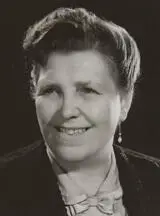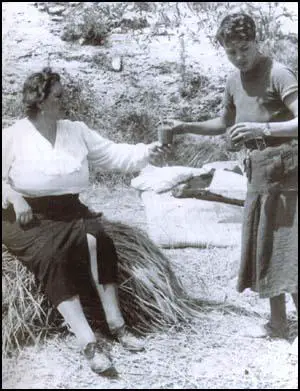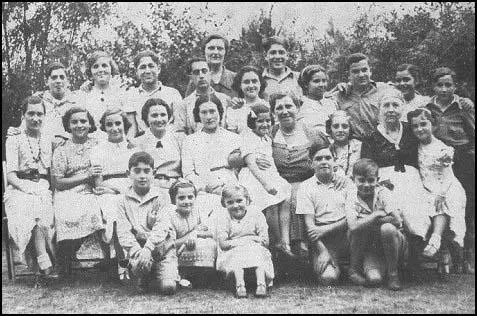Leah Manning

Leah Perrett, the daughter of a Captain in the Salvation Army, was born in Droitwich, Worcestershire, on 14th April 1886. Educated at St. John's School, Bridgwater, and Homerton College, Cambridge, where she joined the Fabian Society. Manning worked as a teacher in Cambridge and in 1913 she married Will Manning.
A member of the Labour Party, Manning became President of the National Union of Teachers in 1930. The following year she was elected to represent East Islington in the House of Commons.
An opponent of Ramsay MacDonald and his National Government, Manning lost her seat in the 1931 General Election. Four years later Manning unsuccessfully contested Sunderland. Manning was active in the anti-fascist movement and was Secretary of the Co-ordinating Committee Against War and Fascism.
Leah Manning was in the Soviet Union when the Spanish Civil War broke out. She immediately travelled to Spain. She told a friend that her main objective was "to find out what goes on and see if there is anything I can do to help." Her friend, Alvarez del Vayo, the minister of foreign affairs in the new Popular Front government, asked her to go back to London: "It's what we want: someone we know and can trust, who will get back to England and tell the Government what is happening here.... Explain the situation to all your old friends in Parliament. Get them to send out a delegation; tell them we must have transport, medical supplies, arms."
In the 1936 Labour Party Conference, several party members including Leah Manning, Ellen Wilkinson, Stafford Cripps, Aneurin Bevan and Charles Trevelyan, argued that military help should be given to the Spanish Popular Front government, fighting for survival against General Francisco Franco and his right-wing Nationalist Army. Despite a passionate appeal from Senora Isobel de Palencia, the Labour Party supported the Conservative Government's policy of non-intervention.
Leah Manning joined forces with Isabel Brown to establish the Spanish Medical Aid Committee. She later recalled: "We had three doctors on the committee, one representing the TUC and I became its honorary secretary. The initial work of arranging meetings and raising funds was easy. It was quite common to raise £1,000 at a meeting, besides plates full of rings, bracelets, brooches, watches and jewellery of all kinds." Eventually she was replaced by George Jeger as secretary.

Manning made several trips to Spain with supplies. She worked closely with Nan Green, who was a senior administrator and Peter Spencer, the treasurer based in Spain of the British Medical Aid Unit. Other key figures were Kenneth Sinclair Loutit, the head of the medical unit and George Green, who was in charge of the convoys. Green was killed at Ebro. As Manning pointed out in her memoirs: "No one was to blame for this: we were finding our way in unknown territory."
There were times when both Green and Manning worked as nurses. They both cared for Harry Dobson when he was wounded at the Battle of the Ebro. Green later recalled Manning holding his hand until he died. Manning explained in her memoirs: "He had had his spleen removed and Reggie Saxton had given him a blood transfusion. As I stood by he opened his eyes and spoke my name. I recognised him as a comrade whom I had met at a by-election in South Wales, a miner from Tonypandy named Harry Dobson. Dr. Jolly told me that it was not possible that he could live in fact they thought only a few hours, so I determined to stay by him until the end. Actually, it was fifteen hours before he passed away but I did not leave him during that time and he seemed very happy to have me there."
In the spring of 1937 Manning helped to arrange the evacuation of Basque children to Britain and while there witnessed the bombing raid of Guernica. In 1938 Manning returned to Spain where she wrote a report on the hospitals where British doctors and nurses were working.

Manning is seated, right of middle, with a child on her right knee.
Manning became the Labour Party candidate for Epping and won the seat in the 1945 General Election. Defeated in 1950 she returned to teaching. Manning unsuccessfully contested Epping in 1951 and 1955. Her autobiography, A Life for Education, was published in 1970.
Leah Manning died on 15th September, 1977.
Primary Sources
(1) Leah Manning wrote about the bombing of Guernica in her autobiography, A Life For Education (1970)
I had arrived in Bilbao on April 24 and on the next day had gone to Mass with the Foreign Secretary and his family, spending the rest of the day in his office. The morning of the 26th I spent quietly at the office of Asistencia Social, discussing in outline the plans for evacuation.
In the afternoon I made my way down to La Prensa where a group of journalists had invited me for a drink, among them Philip Jordan and George Steer, who during the next few weeks were to prove towers of strength and encouragement to me. A day begun so quietly was to end in indescribable horror and dismay.
"A raid's coming up," said Jordan. "Do you want to go down to the shelter?" I shook my head, so we went outside. Phil's ear had caught the sound of bombers in the air, although there had been no warning. Across the hills to the east the air was alive with Heinkels as wave after wave drove in from the sea. They were followed by Junkers. Horror-striken, the Basques amongst us shouted, "Guernica! they're bombing Guernica!" It seemed incredible that such a monstrous thing could happen to this quiet little market town, renowned from time immemorial as the home of Basque liberation where, before the famous oak tree, rulers of Spain had traditionally sworn to observe Basque local rights. Helpless to do anything we watched from the hills. Until nearly eight in the evening, incendiary bombs and high explosives rained down every twenty minutes. The town was open and defenceless; it was crowded with market day visitors and as people fled from the destruction they were dive-bombed and machine-gunned from the air. The roads out of the town were jammed with dead and injured: 1,654 killed; 889 injured.
(2) Leah Manning, report to the Spanish Medical Aid Committee from Catalonia (September 1938)
I suppose that in all the history of modern warfare there has never been such a hospital. It is the safest place in Spain, beautifully wired for electric lights and with every kind of modern equipment. This hospital is evacuated twice a day. It is tragic to add that a large proportion of the evacuations are by death, because only the gravest cases are brought here from the front, and the only ones who remain for longer than the first day or two are abdominals and serious amputations.
Patience Darton and Ada Hodson were working there when we arrived. Patience was just coming on duty for the night and as we went into the cave, the stretcher bearers brought in an English comrade from the British Battalion who was gravely wounded in the abdomen. He had had his spleen removed and Reggie Saxton had given him a blood transfusion. As I stood by he opened his eyes and spoke my name. I recognised him as a comrade whom I had met at a by-election in South Wales, a miner from Tonypandy named Harry Dobson. Dr. Jolly told me that it was not possible that he could live in fact they thought only a few hours, so I determined to stay by him until the end. Actually, it was fifteen hours before he passed away but I did not leave him during that time and he seemed very happy to have me there.
(3) Leah Manning, A Life for Education (1970)
Whilst I had been absent from London, the Committee, with which I was to be most closely associated during the Spanish war, had been formed. Isabel Brown, a dedicated communist, had been receiving sums of money from all over the country to be used for Spanish relief. Medical aid was urgently needed doctors, nurses, trucks and their drivers, and supplies of all kinds. Isabel set about finding people willing to sit on an all-party committee who would undertake the task of raising funds, interviewing personnel, and sending all these things and people to Spain. She brought together the Spanish Medical Aid Committee. We had three doctors on the committee, one representing the T.U.C., and I became its honorary secretary. The initial work of arranging meetings and raising funds was easy. It was quite common to raise £1,000 at a meeting, besides plates full of rings, bracelets, brooches, watches and jewellery of all kinds. Isabel and I had a technique for taking collections which was most effective, and, although I was never so effective as Isabel (I was too emotional and likely to burst into tears at a moment's notice), I improved. In the end, either of us could calculate at a glance how much a meeting was worth in hard cash.
The work soon became so onerous that my job as honorary secretary was relieved by the appointment of George Jeger as salaried secretary. His work through the next three years kept S.M.A.C. running on oiled wheels. I don't think we ever had a moment's anxiety-supplies, instruments, drugs, vehicles, above all doctors, nurses and drivers, had to be found. All personnel going to Spain had to be interviewed and vetted by the committee; the first medical unit was sent out under Sinclair Loutit. I don't think we made many mistakes, but driving up to the front with medical supplies was dangerous work and several of our drivers were wounded. We suffered a severe loss in the death of George Green who was in charge of all our convoys. No one was to blame for this : we were finding our way in unknown territory. But we couldn't go on risking valuable lives, or ambulances and trucks full of supplies, trying to find hospitals or the front in a chaotic situation and with scarcely anyone speaking the language. It was all too amateurish and haphazard. We needed a focal point and someone resident in Spain to whom all supplies should be sent and all personnel report for posting.
When we interviewed Rosita Davson, we doubted whether she would fit such a tough assignment-a tiny, vivacious brunette, she had only one qualification no one else possessed : she was a brilliant linguist, speaking French, German, Russian and fluent Spanish. For such a cosmopolitan crowd as we had working for us in Spain, this was essential. Moreover she had lived in Spain for some years and knew her way about the country. We found a villa for her in Valencia and later a flat in Barcelona. We had certainly been deceived by Rosita's appearance. She was tough all right, resilient, never depressed, and she could work round the clock if the need arose.
I spent two summer holidays with her in Valencia, helping her to get supplies up to the hospitals and, much later in the war, up to the Ebro Front. Just up the road from our Villa, Peter Churchill, our treasurer, shared a villa with the Soviet airmen. Peter was an agreeable, but incalculable person, making strange and unaccountable forays into Turkey and other South European countries. How he got in and out, I never knew, but anyone who has read his autobiography will recognise that he is a strange and elusive person. When later I managed his own bureau in London, I found myself in very deep water indeed.


